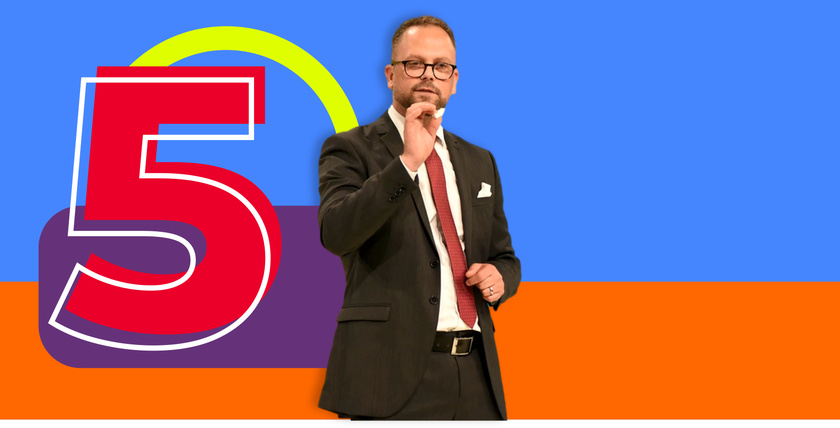BLOG
22. September 2020
Three decades of professional experience in five minutes

On September 12, 2020, the time had finally come. The agency Martina Kapral GmbH organized the 6th International Speaker Slam in Vienna. There, a considerable selection of international speakers met under due distance to choose the best among themselves. And I celebrated my Speaker Slam debut under the strict observation of the expert jury, consisting of the organizer Martina Kapral, Hermann Scherer from the Scherer Academy and Christoph Wirl from TRAiNiNG magazine. Each participant had just five minutes to wow the jury with their performance and captivate the audience. As you can imagine, I racked my brains in advance about how best to go about this. As a market researcher, my mission was already clear: to bring the importance of market research to the fore.
On the one hand, because I have been involved in market research for almost three decades and now see myself not only as an expert in the field, but, better said, as a "mouthpiece" for the customer. On the other hand, because I keep noticing that disruption is haunting companies as a specter. In times of digitalization, innovation and globalization, it is the customer who actually wields the scepter of disruption, no one else.
Back to my presentation: The question of "What?" was thus quickly clarified for me. The real challenge became apparent in the question of "How?". How do I manage to convey 30 years of professional experience, my passion and my conviction on stage in just five minutes in such a way that it hits home with the audience? Rather than winning the competition, I wanted to deliver added value, the famous "aha moment", to the audience. In this strong international field of participants, that's easier said than done.
So, what my presentation needed was a hook. A topic that is on the minds of all entrepreneurs, an unsolved problem whose solution I could serve up on a silver platter. I came to my introduction, the question of all questions: "What do successful companies actually do differently?"
Admittedly, the question sounds a bit lofty to answer in a blanket five minutes. But I am who I am and I love challenges, so, "Challenge accepted!"
Market research has a sometimes dubious reputation. Many decision-makers would like to run away screaming at correlation, statistics and spreadsheets. And Steve Jobs, Jeff Bezos and Elon Musk, as case studies, hang out of our ears like cauliflower. So for a change, I wanted to share a success story that no one had heard before.
"Do you know Jordan Schwartz? A show of hands please.", I asked the audience on Saturday. All I got in response was a clueless shrug of the shoulders. Then I pulled a LEGO brick out of my pocket and asked, "And who knows LEGO?" All hands shot up. Of course, everyone knows LEGO.
The amazing thing about LEGO is that this relatively simple children's toy has survived all the disruptions in the toy market, and in some cases has virtually enabled disruption through its own formats in the first place. Because LEGO excites its customers, LEGO inspires its customers, and LEGO integrates its customers. As does Jordan Schwartz. Jordan was a high school senior and avid LEGO fan who regularly shared his own model ideas online. His posts received countless likes from his peers, the AFOLs (an online community called "Adult Fans of LEGO"). That's how he came to LEGO's attention, too. LEGO invited Jordan to the company's headquarters in Billund, where he worked his way up from intern to designer, developing, among other things, the popular Palace Cinema with more than 2,000 bricks.
Modern product development practices, such as design thinking, consistently point to integrating the customer into the development process. You can't get more involved than making the customer your own collaborator. So, I concluded my story with the conclusion: "That's what I call Customer Centricity in perfection!". I then returned to my actual mission.
For those who had hoped for a concrete answer, a recipe with all the secret ingredients for their entrepreneurial success, I had to sadly disappoint.
"If you are now wondering how you, too, can become successful, then don't ask me, but please ask your customer!", I led.
I am not a fortune teller. The path to success varies depending on the company, the industry, the product and, above all, the target group. As a market researcher, I can't see the future, but I can pave the way for you to figure out how to become successful.
"If you don't know what or how to ask your customer, please ask me!"
I walked off stage with this sentence, the real bottom line of my performance. The audience applauded me, the importance of market research was vividly conveyed, and I was awarded the Hermann Scherer Excellence Award for my performance. All in all, I would say, "Challenge completed!"


Herbert Höckel ist geschäftsführender Gesellschafter hier bei bei der moweb research GmbH. Seit mehr als 25 Jahren ist er Marktforscher. 2004 gründete er die moweb GmbH, welche er bis heute als Inhaber führt. Die moweb aus Düsseldorf ist international tätig und eines der ersten deutschen, auf digitale Verfahren spezialisierte Marktforschungsinstitute.